Related Research Articles

William Gilbert Grace was an English amateur cricketer who was important in the development of the sport and is widely considered one of its greatest players. He played first-class cricket for a record-equalling 44 seasons, from 1865 to 1908, during which he captained England, Gloucestershire, the Gentlemen, Marylebone Cricket Club (MCC), the United South of England Eleven (USEE) and several other teams.

Middlesex County Cricket Club is one of eighteen first-class county clubs within the domestic cricket structure of England and Wales. It represents the historic county of Middlesex which has effectively been subsumed within the ceremonial county of Greater London. The club was founded in 1864 but teams representing the county have played top-class cricket since the early 18th century and the club has always held first-class status. Middlesex have competed in the County Championship since the official start of the competition in 1890 and have played in every top-level domestic cricket competition in England.
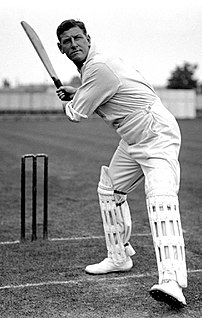
Samuel Moses James Woods was an Australian sportsman who represented both Australia and England at Test cricket, and appeared thirteen times for England at rugby union, including five times as captain. He also played at county level in England at both soccer and hockey. At cricket—his primary sport—he played over four hundred first-class matches in a twenty-four-year career. The majority of these matches were for his county side, Somerset, whom he captained from 1894 to 1906. A. A. Thomson described him thus: "Sammy ... radiated such elemental force in hard hitting, fast bowling and electrical fielding that he might have been the forerunner of Sir Learie Constantine."
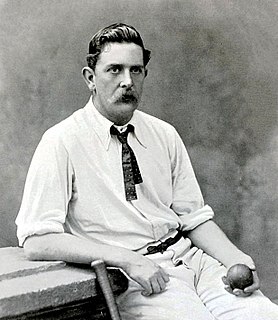
Edmund Peate was an English professional cricketer who played for Yorkshire County Cricket Club and the English cricket team.
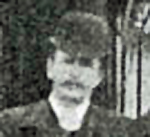
Arnold James Fothergill was an English professional cricketer who played first-class cricket for Somerset County Cricket Club and the MCC in a career which spanned from 1870 until 1892. A left-arm fast-medium pace bowler, he appeared for England in two Test matches in 1889.
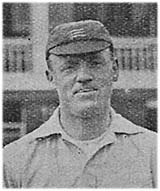
Henry William "Harry" Lee was a professional English cricketer who played first-class cricket for the Marylebone Cricket Club (MCC) and Middlesex County Cricket Club between 1911 and 1934. He made one Test appearance for England, in 1931. An all-rounder, Lee was a right-handed batsman and bowled both off break and slow-medium pace bowling with his right arm. He scored 1,000 runs in a season on thirteen occasions. Part of the County Championship winning sides in 1920 and 1921, Lee aggregated 20,158 runs and took 401 wickets in first-class cricket.

George Thornton was an English amateur first-class cricketer, who played County Championship cricket for Yorkshire County Cricket Club in three matches in 1891, and later that decade for Middlesex, and later appeared in a Test match representing South Africa in 1902.
1947 was the 48th season of County Championship cricket in England. It is chiefly remembered for the batting performances of Denis Compton and Bill Edrich who established seasonal records that, with the subsequent reduction in the number of first-class matches, will probably never be broken. Their form was key to their team Middlesex winning the County Championship for the first time since 1921, although they were involved in a tight contest for the title with the eventual runners-up Gloucestershire, for whom Tom Goddard was the most outstanding bowler of the season. Compton and Edrich were assisted by the fact that it was the driest and sunniest English summer for a generation, ensuring plenty of good batting wickets.
1907 was the 18th season of County Championship cricket in England. Nottinghamshire won their first official title. England played their sixth Test series against South Africa but it was the first to be held in England.
1865 was the 79th season of cricket in England since the foundation of Marylebone Cricket Club (MCC). W. G. Grace made his debut as a first-class player and the new Lancashire County Cricket Club played its first match.
1876 was the 90th season of cricket in England since the foundation of Marylebone Cricket Club (MCC). Gloucestershire reclaimed the unofficial "Champion County" title. A relatively dry summer and improvements to pitches via the heavy roller saw several batting records broken.

John "Jack" Crossland was an English professional cricketer who played first-class cricket between 1878 and 1887. Crossland was recognised as one of the fastest bowlers in county cricket, but critics generally believed that he threw, rather than bowled the ball, a practice illegal in cricket. Contemporaries suggest that, but for the suspicions over his bowling action, Crossland would have played Test cricket for England.

John Thomas Rawlin was an English first-class cricketer, who played twenty seven matches for Yorkshire County Cricket Club between 1880 and 1885, and 229 matches for Middlesex between 1889 and 1909. He toured Australia with Vernon's team in 1887/89. He also played first-class games for the Marylebone Cricket Club (MCC) from 1887 to 1909.
Stephen Cox Newton was an English cricketer who represented, and captained, Somerset County Cricket Club in the late 19th century. During a 14-year first-class cricket career, he also represented Cambridge University, Middlesex and the Marylebone Cricket Club (MCC).
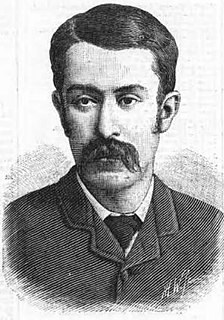
Edward ("Ted") Sainsbury was an English cricketer who represented, and captained, Somerset County Cricket Club in the late 19th century. During a 10-year first-class cricket career, he also represented Gloucestershire and the Marylebone Cricket Club (MCC).

George Benjamin Nichols was a professional first-class cricketer who played 134 matches for Somerset, after starting his career with five first-class appearances for Gloucestershire. He was a key part of the Somerset team that won the 'Second-class County Championship' in 1890 by winning twelve of their thirteen matches, tying the other with Middlesex. A right-handed batsman and right-arm fast-medium bowler, he was known for being able to bowl long, accurate spells.

John Bonamy Challen was a Welsh amateur sportsman who played first-class cricket and association football during the late 19th century. He played football for Corinthian F.C., and was selected to play for Wales four times between 1887 and 1890. As a cricketer, he made over 50 first-class appearances, all for Somerset County Cricket Club. His availability in both sports was limited by his career in education; he was headmaster at a number of schools across southern England.
W. G. Grace is believed to have considered retirement from cricket before the 1878 season after he was seriously injured in a shooting accident the previous autumn which nearly cost him the sight of an eye. Having recovered, he reconsidered and in 1878 played in 33 matches, 24 of which are generally recognised as first-class. His main roles in the season were captain of Gloucestershire County Cricket Club and both match organiser and captain of the United South of England Eleven (USEE). In addition, he represented Marylebone Cricket Club (MCC), the Gentlemen in the Gentlemen v Players fixture and the South in the North v South series. 1878 was a cold, wet summer and not one of Grace's better seasons as a batsman, but he was very effective in such conditions as a right arm medium pace roundarm bowler and completed a sixth successive "double" by scoring 1,151 runs and taking 152 wickets in the recognised first-class matches.
Walter Raleigh Gilbert was an English amateur cricketer who played first-class cricket for Middlesex and Gloucestershire between 1873 and 1886. A cousin of W. G. Grace, he played for Gloucestershire when, dominated by the Grace family, it was the leading county. Gilbert's best season was 1876, when he scored 205 not out for the county, but he was subsequently less successful. Closely connected with the United South of England Eleven, a professional touring team of which he eventually became secretary, Gilbert was financially affected by a declining interest in such teams. With insufficient income to continue as an amateur he became a professional in 1886, but played only one match before he was caught stealing from teammates in a minor match, ending his first-class career. After serving a 28-day prison sentence Gilbert moved to Canada, where he worked for the Land Titles Office in Calgary while remaining a prominent cricketer. He died aged 70 in 1924, but for nearly 60 years after his death, there seemed to be a conspiracy of silence over his fate.
W. G. Grace played in 32 matches in the 1871 English cricket season, 25 of which are recognised as first-class. His main roles in 1871 were as captain of Gloucestershire County Cricket Club and as both match organiser and captain of the United South of England Eleven (USEE). In addition, he represented Marylebone Cricket Club (MCC), the Gentlemen in the Gentlemen v Players fixture and the South in the North v South series.
References
- 1 2 "T. Wilson" . www.cricketarchive.com. Retrieved 30 December 2019.
- ↑ "Thomas Wilson". www.espncricinfo.com. Retrieved 30 December 2019.
- 1 2 3 "Middlesex v Gloucestershire". The Field. London. 19 June 1880. p. 49.
- ↑ "Orleans Club v Young Players of Middlesex". London Daily News. London. 14 June 1880. p. 3.
- ↑ "Middlesex v Gloucestershire". Sporting Life. London. 12 June 1880. p. 4.
- ↑ "Death of Mr. Harry Williams". Biggleswade Chronicle. Biggleswade. 14 November 1941. p. 1.
- ↑ "Cricket: Herts v M.C.C. and Ground". Hertford Mercury and Reformer. Hertford. 8 August 1885. p. 4.